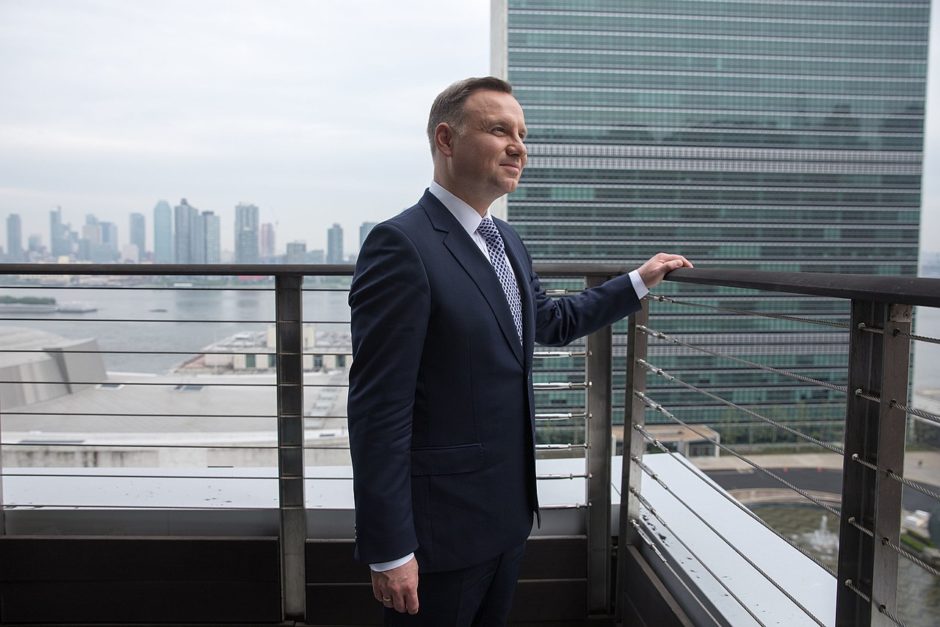The 75th anniversary of the liberation of the Auschwitz-Birkenau extermination camp in Poland will be solemnly marked at a Holocaust conference taking place in Jerusalem on January 23. Regarded as one of the biggest international events ever hosted by Israel, it will be attended by 41 heads of state and delegations from 49 countries. Among the guests will be U.S. Vice-President Mike Pence, Russian President Vladimir Putin, German President Frank-Walter Steinmeier, French President Emmanuel Macron and Prince Charles, the heir to the British throne.
Oddly enough, one important person will be conspicuously missing.
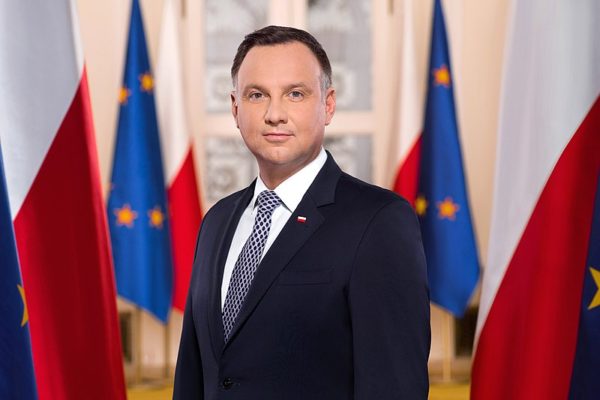
The president of Poland, Andrzej Duda, was supposed to attend, but he pulled in indignation out after Israeli President Reuven Rivlin declined to allow him to address the event, which is being co-organized by Rivlin’s office, the Yad Vashem Holocaust memorial and education center, and the World Holocaust Forum Foundation, which was founded by the Russian Jewish businessman and philanthropist Moshe Kantor, who’s reportedly close to Putin.
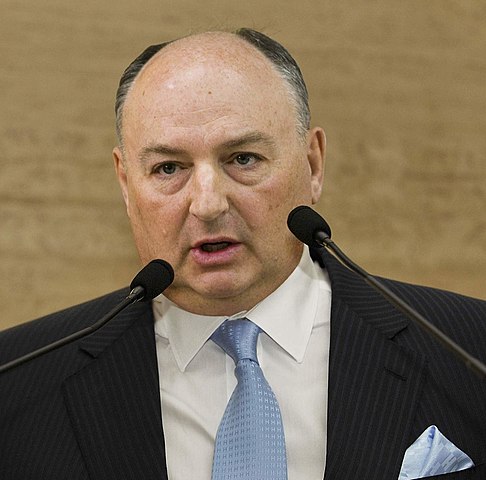
Duda was not invited to deliver a speech the grounds that this honor is reserved only for the representatives of the major Allied powers during World War II — the United States, Russia, Britain and France — and Germany, the aggressor.
Amid an uproar in Poland, Harel Tubi, Rivlin’s spokesperson, said that Israel has reconsidered its position and had offered Duda a place on the podium. Duda rejected Israel’s overture, and Rivlin’s office said he would meet Duda next week at the International Holocaust Remembrance Day ceremony in Poland.
Let’s be clear. From the very outset, Duda should have been invited to address the conference. That he was shunted aside is very strange and certainly most unacceptable. Certainly, Duda cannot be blamed for boycotting the conference.
Rivlin’s misbegotten decision was a monumental gaffe, an insulting and thoughtless snub that Poland, in all justification, will not likely forget any time soon.

Lest it be forgotten, Poland was home to 3.3 million Jews before World War II, comprising one of the world’s largest and most venerable Jewish communities. And the main Nazi concentration camps, including Treblinka, Majdanek and Sobibor, which consumed the lives of the majority of Polish Jews, were all located on Polish soil. For better or worse, Poland has been inextricably associated with the ebb and flow of Jewish history on the European continent.
Why, then, did Rivlin exclude Duda as a speaker? Apart from the official explanation, which does not hold much water, three factors may have accounted for Rivlin’s decision — the debate over the origins of World War II, the current tensions between Poland and Russia, and the nature of Israel’s bilateral relationship with Russia.
Late last year, the European Parliament passed a resolution blaming Nazi Germany and the Soviet Union for having started the war. It’s a reasonable thesis. Germany, an aggressive and expansionist power, pushed Europe into war by invading Poland. But Joseph Stalin’s non-aggression pact with Adolf Hitler, in which they secretly divided Poland and established spheres of influence in Eastern Europe, may well have been one of the sparks that ignited the war, as Putin himself acknowledged a decade ago when he described that agreement as “harmful and dangerous.”
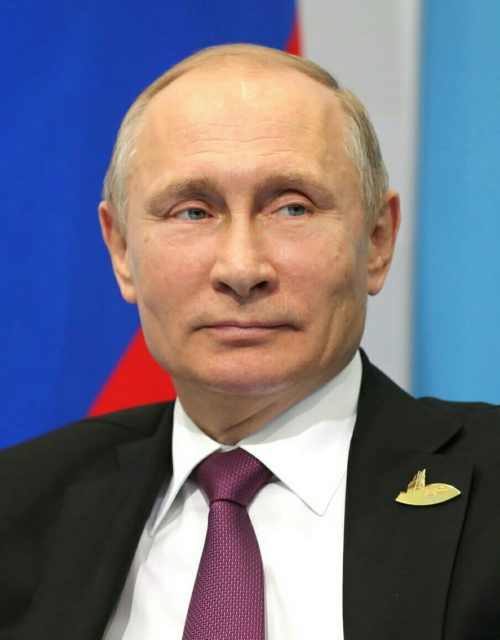
In the years since Putin’s appraisal, the Russian government has revised its assessment of Stalin’s non-aggression pact with Hitler. Putin himself has said it was required for defensive purposes to rebuild the Soviet armed forces before an inevitable clash of arms with Germany, while Russia’s minister of culture has hailed it as a “triumph of Soviet diplomacy.”
More recently, this controversial issue has led to a bitter war of words between Russia and Poland, which broke free of more than four decades of Soviet hegemony following the collapse of Communist rule in Russia, the Baltic states and Eastern Europe in the late 1980s and early 1990s.
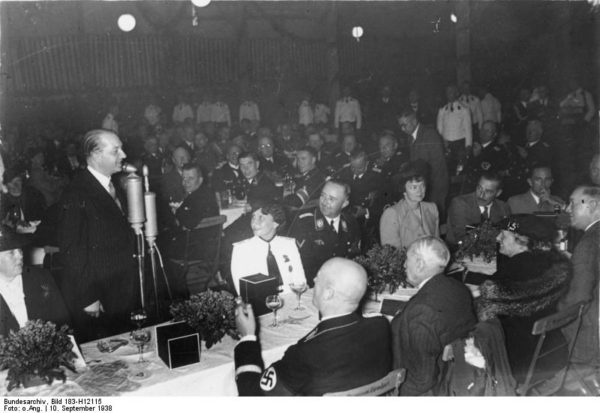
This past December, Putin accused Poland of colluding with Nazi Germany in the years leading up to the war. In an aside, he accused the Polish ambassador to the Third Reich, Josef Lipski, of having told Hitler he would be honored with a statue in Warsaw if he succeeded in deporting Jews from Poland. In an allusion to Lipski, Putin asserted, “A bastard, an antisemitic pig, I have no other way to say it.”
Reacting to Putin’s broadside, Polish Prime Minister Mateusz Morawiecki accused him of issuing “repeated lies” about the history of the war. “The Russian leader is well aware that his accusations have nothing to do with reality.”
He added, “Without Stalin’s complicity on the partition of Poland, and without the natural resources that Stalin supplied to Hitler, the Nazi German crime machine would not have taken control of Europe.”
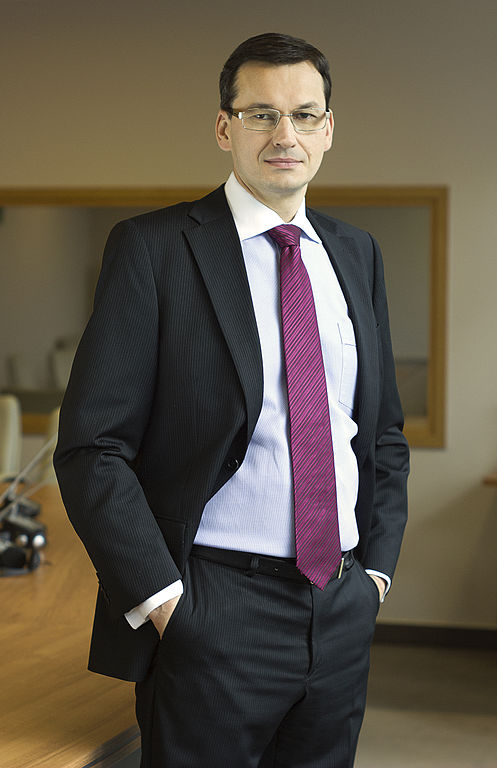
Yesterday, in the latest salvo of mutual accusations, Morawiecki accused Russia of trying to “rewrite history.” More to the point, the Polish prime minister accused the Soviet Union of inaction, claiming the Soviet government declined to intervene in the 1943 Warsaw Ghetto revolt and the 1944 Warsaw uprising. “The Red Army stared on idly at the agony of Warsaw,” he said, referring to the two rebellions.
Morawiecki, too, accused the Red Army of passing up an opportunity to liberate Auschwitz sooner than 1945. As he put it, “And while the Red Army did eventually liberate Auschwitz, the camp could have been liberated half a year earlier. In the summer of 1944, the Soviet army stood 200 kilometres from Auschwitz, but the offensive was halted, allowing the Germans time to retreat and organize death marches until January 1945. Rescuing Jews was never a priority for Stalin and the Red Army.”
Morawiecki has a point, of course. The rescue of Jews imperilled by Germany’s genocidal policy was not high on the list of Soviet war aims. Nonetheless, the Israeli government has chosen to gloss over this period so as to cultivate its current relations with Russia, even if this come at the expense of its ties with Poland.
Russia, a key player in the Middle East, tolerates Israeli air raids in Syria aimed at bombing Iranian military facilities. For the past few years, Iran, Israel’s most deadly enemy, has attempted to entrench itself militarily in Syria, a Russian client state, and Israel has pushed back hard with hundreds of raids. To ensure Russian acquiescence of its strikes, Prime Minister Benjamin Netanyahu has repeatedly flown to Moscow to confer with Putin.
At the same time, Israel’s relationship with Poland has degenerated, caused by the passage of a Polish law criminalizing accusations attributing culpability to the “Polish nation” for the Holocaust, and by Poland’s refusal to pay restitution for private Jewish property successively expropriated by Nazi Germany and the Communist regime in Poland.
Last February, the bitterness broke into the open when Duda announced that Poland would not send a representative to a summit of Eastern and Central European states due to occur in Israel. This happened after Israel Katz, the newly appointed Israeli foreign minister, declared that Poland had “collaborated” with the Germans during the Holocaust, and that Poles “took part in the extermination of Jews.”
Regrettably, Israel has been caught in the middle of Russia’s dispute with Poland. But Israel exacerbated the conflict by inexcusably subbing Poland’s president.
Israel will now pay the price for its sloppy diplomacy.
